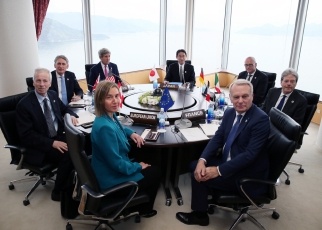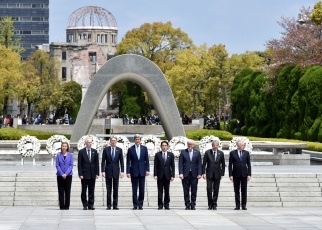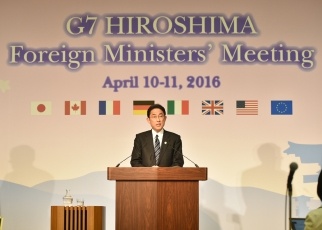G7/G8
G7 Hiroshima Foreign Ministers’ Meeting
April 11, 2016



On Sunday, April 10 and Monday, April 11, the G7 Foreign Ministers' Meeting chaired by Mr. Fumio Kishida, Minister for Foreign Affairs of Japan, was held in Hiroshima, Japan. The overview of the meeting is as follows. (The meeting was attended by the foreign ministers of the G7 countries and the High Representative of the European Union (EU) for Foreign Affairs and Security Policy (some sessions were attended by representatives)).
After the meeting reached its conclusion, the following documents were issued:
After the meeting reached its conclusion, the following documents were issued:
1. Session 1 & 2
(1) Measures to deal with terrorism and violent extremism, and the refugee issue
The G7 Ministers shared the view that they strongly condemn terrorism and will collectively fight violent extremism, and that moderate ideas and tolerance are important. Looking ahead to the Ise-Shima Summit, they agreed to formulate specific measures for bolstering counterterrorism as action plans. With regard to the refugee issue, they affirmed the importance not only of assistance for refugees and internally-displaced persons, but of supporting countries and societies that are accepting refugees.Minister Kishida stressed the importance of the G7 countries utilizing their respective strengths, and proceeding with initiatives related to terrorism and the refugee crisis in a mutually complementary way, and in a manner that generates synergistic effects.
(2) Other
Furthermore, the Ministers discussed situations in the Middle East, such as Syria, Iraq, Afghanistan, Iran, the Middle East Peace Process, and Libya, and affirmed the cooperation of the G7.2. Session 3: Working Dinner
(1) North Korea
Minister Kishida explained North Korea's recent repeated provocative remarks and actions, and particularly nuclear tests, missile launches and human rights violations, including the abductions issue. All the countries condemned these actions and agreed to strongly urge to immediately address these issues. They also welcomed the adoption of United Nations Security Council Resolution (UNSCR) 2270, and called on the international community to fully implement all relevant UNSC resolutions, including UNSCR 2270.(2) Maritime security
With regard to maritime security, the G7 Ministers expressed concern about the situation in the East China Sea and South China Sea, where unilateral changes to the status quo that raise tensions are being witnessed.The G7 Ministers also called on all countries to refrain from such actions as land reclamations including large scale ones, the building of outposts and their use for military purposes.
The G7 Ministers also firmly requested that countries fully implement any decisions rendered by the relevant courts and tribunals which are binding on them, including arbitration procedures.


